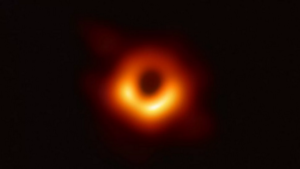The Humanevangelist: When Liberal Theology Goes Off the Deep End
 On April 10, 2019, the Event Horizon Telescope released the first-ever image of a supermassive black hole in galaxy M87. (Credit: Event Horizon Telescope Collaboration)
On April 10, 2019, the Event Horizon Telescope released the first-ever image of a supermassive black hole in galaxy M87. (Credit: Event Horizon Telescope Collaboration) “Ye blind guides, which strain at a gnat, and swallow a camel.”
—Jesus, as quoted in Matthew 23:24
I’m generally a fan of liberal religionists—Christian, Jewish, Muslim, or whatever. They accept science, form welcoming communities for the vulnerable, and do a lot of good in the world.
But liberal religion has a great blind spot. It can’t see, or perhaps can’t acknowledge, that its efforts to clothe the findings of science in theological garb look ridiculous. Case in point: the black hole photo. Before we pass through the theological event horizon, I need to let you in on a few “secrets.”
Black holes are not especially mysterious. For something never seen before now, scientists have done astonishing work in analyzing them to the core… almost. Thanks to their work, we know, with a high degree of confidence, that:
- Black holes aren’t entirely black. The late Stephen Hawking worked out that they have a slight temperature at the event horizon.
- Black holes evaporate. The temperature represents a faint leakage of photons at the event horizon, where one of a pair of entangled particles escapes while its partner falls in.
- Black holes are antithetical to life, beauty, and order. They not only shred anything that falls into their clutches, they crush space and halt time.
Sound holy to you? Consider some thoughts from Ed Simon, who writes for Religion Dispatches and is the author of America and Other Fictions: On Radical Faith and Post-Religion. Simon introduces black holes as “these mysterious ruptures in space and time.” Then he tees off.
If you have a similar attitude to mine, then you were perhaps struck by the strange sublimity of this photograph. There are, it must be said, certain theological implications to that celestial wonderment.
Then comes a sort of koan: “God need not be real for divinity to be an applicable concept, for it’s good enough that the black hole is real.”
Maybe I’m a dullard, but I can’t make any more sense of that than of, well, this:
… the place where physics falls apart, where logic shall have no dominion, where the seemingly unassailable kingdoms of time and space are finally conquered. Where all of the mathematics fails, and something else must take hold.
But… if it weren’t for physics and math, we wouldn’t know diddly about black holes; we wouldn’t even have looked for one in the first place! This seems to occur to Simon, for he goes on to write: “No doubt the physics of the black hole are circumscribed by mathematics, but our supplications to it speak a different language.”
And what language might that be? Media-speak!
Notice the gloss of the unavoidable sacred in the media coverage about the discovery: [Marina] Korin [in the Atlantic] writes of “an unknown realm that can only be imagined”; Lee Billings at Scientific American describes the object as an “almost featureless nothingness”; and the title of Dennis Overbye’s article at the New York Times directly quotes the 17th century poet John Milton, who, in Paradise Lost, described hell as having “No light, but rather darkness visible.”
But it’s surely straining at gnats to find the sacred in these scribblings. They are faint-hearted compared with the fulsome prose that follows:
Such is the enormity, the awesome, sacred enchantment of such a thing, that even in our ostensibly secular age we must mine the metaphors of faith to generate something equivalent with our feelings before the altar of the singularity.
And on that altar, Simon sacrifices the last pretense of rationality and puts God back into the divinity that earlier he claimed had no need of it: “Our black hole, a reminder that there are some beautiful things beyond our grasp, some holy things beyond our vision. The closest we’ll ever come to a photograph of God.”
Why do I mock this purple paean to a black hole? Have I no wonder? Have I no awe? I mock because I care. Liberal religion is a valuable ally. It cannot survive if it becomes ridiculous. Already, it is bleeding believers at a far faster rate than authoritarian religions. One reason may be that it strains to align theology with each new advance in science. Who can believe the incoherent mess above?
I have a friend who is both a physicist and a liberal Christian. He is also, incidentally, one of those people who does a lot of good in the world. Once, after listening to a talk he gave on Einstein’s annus mirabilis—the “miraculous” year in which the great young scientist published three papers that founded both relativity and quantum mechanics—I asked him how he reconciled his grasp of science with his religious faith.
“Oh, I don’t,” he replied. “Faith doesn’t enter into science at all.” Putting one hand at right angles to the other, he said, “They are orthogonal.” And yet he has faith.
There’s great wisdom in that approach. Among the many virtues of science is that it defines the limits of its knowledge. Within those limits, it is sovereign when it comes to discovering and defining reliable knowledge. So, let me suggest that liberal theology should “Render unto Caesar the things that are Caesar’s,” and, well, you know the rest.
